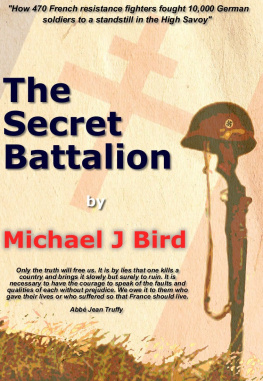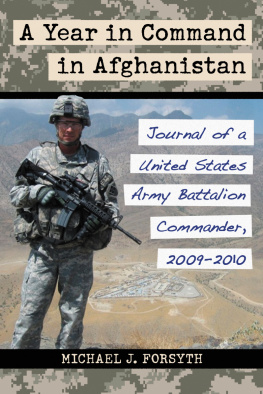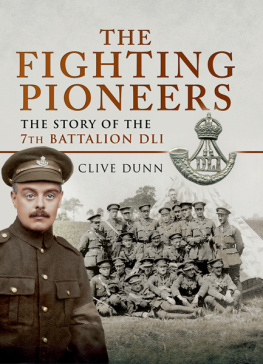THE SECRET BATTALION
MICHAEL J. BIRD
For Jane and Michael
Only the truth will free us. It is by lies that one kills a country and brings it slowly but surely to ruin. It is necessary to have the courage to speak of the faults and qualities of each without prejudice. We owe it to them who gave their lives or who suffered so that France should live.
Abb Jean Truffy
CHAPTER ONE
The fourth man in the cave was dead. His companions dragged his body out into the daylight and then stood shivering in the blast of a bitter wind with their hands above their heads. They had not put up any resistance when they had been discovered, and now they made no attempt to break away and run because they were too tired and too weak and because there was no fight left in them. But even if they had had the strength and the will it would have been impossible for them to escape; the men of the German patrol who had ferreted them out of hiding were all around them and held them covered with rifle and machine gun.
After waiting for a few seconds the Germans tossed hand-grenades through the narrow, fern-covered entrance to the cave just in case there was anyone left inside who had not seen the wisdom in surrender. The explosions shook the ground and a cloud of dirt and small stones shot out of the opening. Satisfied, the patrol then moved off shepherding their prisoners ahead of them but leaving the dead man where he lay.
On every side, across a bleak mountain landscape covered with thick snow that was pock-marked with shell and bomb craters, other men were at work. Captured weapons were being stacked and listed and the few buildings which were still intact were first thoroughly searched and then set on fire.
The dead on both sides had yet to be counted but there would be time for that later. Top priority had been given to tracking down those of the enemy who had survived the fighting and were now in flight. Military and police patrols were scouring the mountains and at their approach desperate, hunted men hidden among the rocks or dodging from tree to tree, froze, held their breath and prayed to be lucky.
At 11:00 A.M. on Monday, March 27, 1944, General Pflaum of the 156th German Alpine Division was informed, "All enemy positions overrun and occupied by our forces." He passed the message on to the S.S. Decisions as to reprisals and the fate of prisoners taken during and after the fighting were up to them and their associates and were questions with which the General felt he need not concern himself. For him the battle of the Plateau of Glires was over.
What follows is an account of that battle and the train of events which led up to it during December 1943 and the first three months of 1944. It is the story of the Resistance Movement in one Department of France. Above all, though, it is the story of the 470 men who went up into the mountains of the High Savoy six months before the Allied invasion of Europe to play their part in a tragedy.
On May 10, 1940, Hitler ordered the German invasion of the Low Countries. The long and inactive winter months which had followed the collapse of Polish resistance and the outbreak of World War II were at an end. The forces of the Wehrmacht cut through Belgium and Holland; as the British and French hastily redeployed their forces to meet this sudden and totally unexpected blitzkrieg, General von Rundstedt launched a powerful offensive along the River Meuse. By May 15, the tanks of his Panzer Divisions had penetrated deep into France.
The French Army and the British Expeditionary Force were quite unprepared to fight against such a weight of armour, an air force which outclassed them and against brilliant military tactics which they were unable to cope with or to counter. Within a staggeringly short time Holland had been overrun and the Belgians had capitulated, and with these German triumphs the ultimate fate of France was no longer in any doubt. Everywhere the British and French armies were in retreat and the country faced disaster.
In a desperate bid to save the situation the French Premier, Paul Reynaud, reshuffled his Cabinet and brought into the Government, as his Chief Military Adviser, the 84-year-old hero of the First World War, the father figure and the idol of his countrymen, Marshal Henri Philippe Petain. But the aged Marshal, who had been recalled as Ambassador to Spain at the eleventh hour to help save France, was merely to serve as one of the liquidators of a militarily bankrupt nation teetering into defeat.
The battle for France lasted only six weeks. On June 9, Rouen was captured and Paris was threatened by a battlefront stretching from Vernon on the River Seine to Compigne. On that day the French Government left the capital for Tours.
For his part, Premier Reynaud was determined not to capitulate to Germany, but by bringing Petain into the Government he only succeeded in dividing his Cabinet colleagues. The Marshal had made it clear from the very moment he took up his appointment that he was in favour of seeking an armistice, and his opinion carried great weight with many of the Ministers.
Probably no one could have saved France from disaster in June 1940, but a great man could have saved her from dishonour. There was no such man, however, in the French High Command or in the higher Cabinet posts, though there was, in fact, a "man of destiny" holding a junior ministerial office. It was this man, the 49-year-old General Charles de Gaulle, who was shortly to come into world prominence as the head of a Free French Government in exile.
Unable to swing a majority vote in favour of continuing the war, Reynaud had no alternative but to resign and on June 16, 1940, he did so. Petain was the obvious successor and the next day the old Marshal broadcast a message to the nation in which he said that it was necessary to end hostilities and seek an honourable peace with Germany as between soldiers. He ordered all French troops to stop fighting and thus completed the demoralization of the army.
As the British Expeditionary Force was hastily evacuated, French and German envoys met to discuss the terms of an armistice. This was Hitler's greatest triumph; France had fallen.
The armistice terms demanded by the Germans turned out to be far more generous than anyone had dared to imagine. The country was to be divided into two zones; one, amounting to about three fifths of the country and including Paris and the French Channel and Atlantic ports, was to be occupied by German troops, and the other was to remain unoccupied and administered by the French. The Petain Government was to be allowed to retain control of France's overseas colonies, and the Germans made no attempt to take over the French fleet. Furthermore, the defeated nation was to be permitted to maintain a small armistice army within the Unoccupied Zone. The price exacted by Hitler for these generous concessions was the promise of French passivity throughout the remainder of the war and the support of the French Government for German military measures within the occupied part of the country.
Prime Minister Petain set up his Government in the town of Vichy, which, from that day on, was recognized as the capital of the Unoccupied or Free Zone. For the next five years the name "Vichy" was to be synonymous with French collaboration with the Nazis.
For a long time after 1940 France was, in the main, a nation of shocked, bewildered, totally demoralized and bitter people who felt that they had been betrayed by Britain and let down in some indefinable way by America. The vast majority of French men and women were more than willing to opt out of a suddenly savage war for which they had shown little spirit in the first place. Their one desire was to salvage what they could from the wreckage and then resume, as closely as possible, the pattern of their everyday lives.












